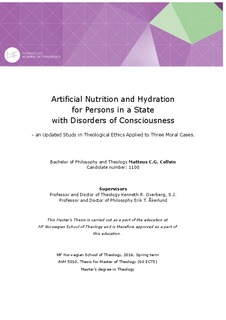Artificial Nutrition and Hydration for Persons in a State with Disorders of Consciousness - an Updated Study in Theological Ethics Applied to Three Moral Cases
| dc.contributor.author | Collvin, Matteus | |
| dc.date.accessioned | 2016-08-30T07:00:38Z | |
| dc.date.available | 2016-08-30T07:00:38Z | |
| dc.date.issued | 2016-08-30 | |
| dc.identifier.uri | http://hdl.handle.net/11250/2402619 | |
| dc.description.abstract | The Catholic Church has, over the past decade, given clear signals in the official teaching that one should not withdraw the artificial supply of nutrition and hydration from a person in a permanent vegetative state because this is not a medical treatment, but a basic human right. This master thesis considers not only the historical development, but above all the past decade's research, to investigate the advantages that the artificial supply of nutrition and hydration provide, in proportion to the burden placed on the unconscious patients. The thesis reflects on how strictly the Catholic Church's teaching should be interpreted, in light of the moral theological tradition, and the insights of the new findings. Deeper insights into different degrees of consciousness judged to be relevant to the ethical evaluation of three moral cases are of special interest. | nb_NO |
| dc.language.iso | eng | nb_NO |
| dc.subject | katolske kirke | nb_NO |
| dc.subject | teologisk etikk | nb_NO |
| dc.title | Artificial Nutrition and Hydration for Persons in a State with Disorders of Consciousness - an Updated Study in Theological Ethics Applied to Three Moral Cases | nb_NO |
| dc.type | Master thesis | nb_NO |
| dc.subject.nsi | VDP::Humanities: 000::Theology and religious science: 150 | nb_NO |
| dc.subject.nsi | VDP::Humanities: 000::Philosophical disciplines: 160::Ethics: 164 | nb_NO |
| dc.source.pagenumber | 146 | nb_NO |
Files in this item
This item appears in the following Collection(s)
-
Masteravhandlinger / Master theses [1267]
Masteravhandlinger og spesialavhandlinger innlevert fra høsten 2008-
